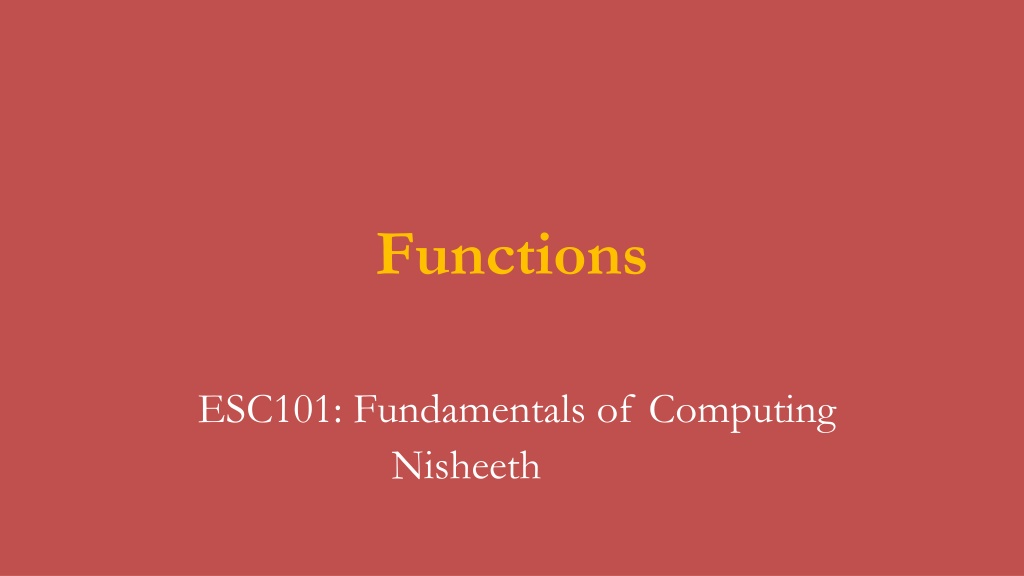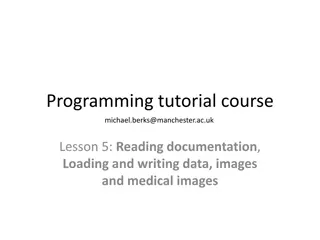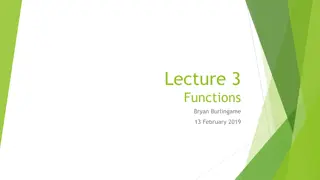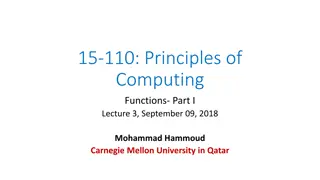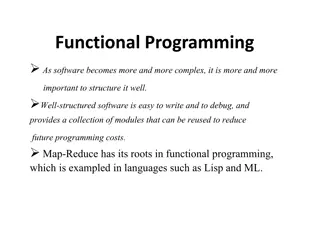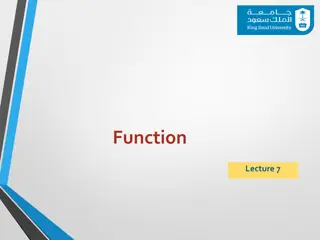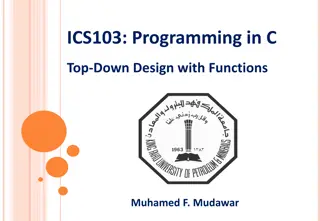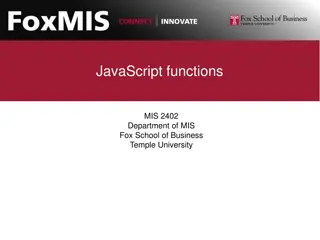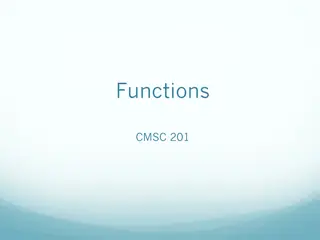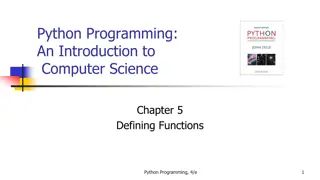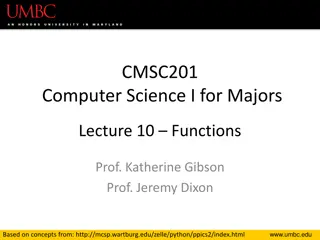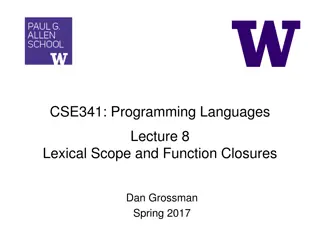Understanding Functions in C Programming
Functions play a crucial role in C programming, allowing for modularity and reusability of code. This content covers the basics of functions, creating custom functions, passing arguments, returning values, and the anatomy of a C function. Learn about defining functions, passing arguments effectively, and understanding how functions interact with the compiler.
Download Presentation

Please find below an Image/Link to download the presentation.
The content on the website is provided AS IS for your information and personal use only. It may not be sold, licensed, or shared on other websites without obtaining consent from the author. Download presentation by click this link. If you encounter any issues during the download, it is possible that the publisher has removed the file from their server.
E N D
Presentation Transcript
Functions ESC101: Fundamentals of Computing Nisheeth
Announcements Hope you enjoyed the exam Upcoming exams Lab mid sem exam on 15th Feb 1000 - 1600 Theory mid sem exam on 21st Feb 1800-2000 Lessons from MQ1 Be on time Bring ID Write roll numbers on every answer sheet 2
We have seen functions before main() is a special function. Execution of program starts from the beginning of main() scanf( ), printf( ) are standard input-output library functions sqrt( ), pow( ) are math functions in math.h
Writing our own functions.. We or someone else may have already written this max function and tested well (so very little chance of error) int max (int a, int b) { if (a > b) return a; else return b; } A standard program for max of two numbers int main () { int x; int a,b; scanf( %d%d ,&a,&b); if(a>b) x = a; else x = b; printf( %d ,x); return 0; } int main () { int x; int a,b; scanf( %d%d ,&a,&b); x = max(a, b); printf( %d ,x); return 0; } A program with our own function
int max (int a, int b) { if (a > b) return a; else return b; } 2 arguments a and b, both of type int. (formal args) Return Type Function Name Body of the function, enclosed inside { and } (mandatory) returns an int. int main () { int x; x = max(6, 4); printf( %d ,x); return 0; } Call to the function. Actual args are 6 and 4. 5
The Anatomy of a C Function How we usually speak to a human How we must speak to the compiler isUpperAlpha is a function that takes in a character (let us call that character x) as input and gives an integer as output Upon receiving input, please create an integer variable a and store 1 in a if input is upper case alphabet else store 0 in a Please output the value of a to whomever used this function A function may have many inputs but only one output int isUpperAlpha(char x){ int a = (x >= 'A') && (x <= 'Z'); return a; } Programmers often call the process of giving inputs to a function as passing arguments to the function Yes you can! But you have to be a bit clever about doing so We will teach you 3 ways to return more than one output in this course Name of function: isUpperAlpha Arguments: one character Return type: integer So I cant write a function that returns 2 integers say x and y coordinates? Inputs to a function are called its arguments A function returns its output
Why use functions? Break up complex problem into small sub-problems. Solve each of the sub-problems separately as a function, and combine them together in another function. The main tool in C for modular programming.
Functions help us write compact code Example : Maximum of 3 numbers int main(){ int a, b, c, m; int max(int a, int b){ if (a>b) return a; else return b; } This code can scale easily to handle large number of inputs (e.g.: max of 100 numbers!) /* code to read * a, b, c */ if (a>b){ if (a>c) m = a; else m = c; } else{ if (b>c) m = b; else m = c; } /* print or use m */ int main() { int a, b, c, m; /* code to read * a, b, c */ m = max(a, b); m = max(m, c); /* print or use m */ return 0; } return 0; }
Other benefits of writing functions Code Reuse: Allows us to reuse a piece of code as many times as we want, without having to write it. Think of the printf function! Procedural Abstraction: Different pieces of your algorithm can be implemented using different functions. Distribution of Tasks: A large project can be broken into components and distributed to multiple people. Easier to debug: If your task is divided into smaller subtasks, it is easier to find errors. Easier to understand: Code is better organized and hence easier for an outsider to understand it.
Other benefits of writing functions Allows you to think very clearly E.g. if you want to do something if the integer n is a prime number or if it is divisible by 11 Writing code that has modules is a type of modular programming it is the the industry standard! E.g. in this case, primality testing is one module, checking for divisibility by 11 is another module if(isPrime(n) || isDivby11(n)){ } Write the body of the if condition without worrying about primality testing etc and then define the functions later You can break your code into chunks called modules Each module handled using a separate function
int max (int a, int b) { if (a > b) return a; else return b; } 2 arguments a and b, both of type int. (formal args) Return Type Function Name Body of the function, enclosed inside { and } (mandatory) returns an int. int main () { int x; x = max(6, 4); printf( %d ,x); return 0; } Call to the function. Actual args are 6 and 4. 11 ESC101: Fundamentals of Computing
Function Terminology Function Name: must be a valid identifier abc, a124, _ab1. Ideally, should reflect what the function does Same rule as variable names Arguments: can be int, long, float, double, char Can also have pointers and even arrays as input soon! Return type: what does the function return When you use a function, we say you have called that function. If the function outputs something, we say the function returned that output back to you ESC101: Fundamentals of Computing
Function Practice Exercises Define a function to input two integers, output their max Define a function to print Hello World Define a function to output 1 if input is prime else 0 Define a function to input two integers and print Hello World if their max is prime Define a function to print the max of 3 numbers Define a function to input a character, output its upper case version if lower case else output the character itself ESC101: Fundamentals of Computing
Function Declaration? We declare variables before using them. For example int x; x = 2; Do we have to declare functions before using them? Not necessary. Optional in modern C If you do, here is what a function s declaration looks like Also known as function prototype return_type function_name (comma_separated_list_of_args); All 3 declarations are equivalent. Variable names don t matter, and are optional. Note the semi-colon Header files usually contains function declarations int max(int a, int b); int max(int x, int y); int max(int , int); Position of declaration must be before the first call to the function in the code, and also not inside any function ESC101: Fundamentals of Computing
#include <stdio.h> Prototype int checkPrimeNumber(int n); int main() { int n1, n2, i, flag; printf("Enter two positive integers: "); scanf("%d %d", &n1, &n2); printf("Prime numbers between %d and %d are: ", n1, n2); } for(i=n1+1; i<n2; ++i) { // i is a prime number, flag will be equal to 1 flag = checkPrimeNumber(i); if(flag == 1) } return 0; Function call printf("%d ",i); // user-defined function to check prime number int checkPrimeNumber(int n) { int j, flag = 1; for(j=2; j <= n/2; ++j) { } return flag; } Definition if (n%j == 0) { } flag =0; break; ESC101: Fundamentals of Computing
Position of a Function If not declared already, the called function must be defined before where it is called. Can define it below the calling function only if the called function s return type is int (else compiler assumes int return type and will complain if it finds some other return type) int max (int a, int b) { if (a > b) return a; else return b; } int main () { int x; x = max(6, 4); printf( %d ,x); return 0; } int main () { int x; x = max(6, 4); printf( %d ,x); return 0; } int max (int a, int b) { if (a > b) return a; else return b; } ESC101: Fundamentals of Computing
Arguments and Return types You can define a function that takes in no input and gives no output Even void print(){ } works void print(void){ printf("Hello World"); } void sum(int a, int b){ printf("Sum %d", a+b); } You can define a function that takes inputs but gives no output char getFirstAlpha(void){ return 'A'; } You can define a function that takes no input but gives an output Even char getFirstAlpha(){ } works ESC101: Fundamentals of Computing
More on Arguments Argument name can be any valid variable name Another type of scope rule for variables. Not block based but function based int max(int a1, int b1) { int m1 = 0; if (a1 > b1) m1 = a1; else m1 = b1; return m1; } } int max(int a, int b) { int m = 0; if (a > b) m = a; else m = b; return m; m1, a1, b1 scope of Can reuse a variable name even if this name used in main or another function Calling a function is like creating a clone of Mr C. This clone starts afresh, with any inputs you have given. The clone forgets all old variable names and values int min(int a2, int b2) { int m2 = 0; if (a2 < b2) m2 = a2; else m2 = b2; return m2; } } int min(int a, int b) { int m = 0; if (a < b) m = a; else m = b; return m; m2, a2, b2 scope of int main() { } int main() { } Will see more about this cloning behaviour later ESC101: Fundamentals of Computing
More on Arguments If you have promised to give a function two integers, please give it two integers If you give it only one or three integers, compilation error If you give it two floats or else one char and one int, automatic typecasting will take place Be careful to not make typecasting errors ESC101: Fundamentals of Computing
More on Return May write return statement many times inside a function When Mr C (his clone actually) sees a return statement, he immediately generates the output and function execution stops there. The clone dies and the original Mr C takes over For functions that do not need to return anything i.e. void return type, you can either say return; or else not write return at all inside the function body in which case the entire body will get executed If you return a float/double value from a function with int return type, automatic typecasting will take place. Be careful to not make typecasting mistakes ESC101: Fundamentals of Computing
More on Return The value that is returned can be used safely just as a normal variable of that same data type You can freely use returned values in expressions Be careful of type though main() is also a function with return type int main() is like a reserved function name. Cannot name your function main Can even use within printf int main(){ printf("%d", sum(3,4) - sum(5,6)); return 0; } int sum(int x, int y){ return x + y; } ESC101: Fundamentals of Computing
Function and Expression A function call is an expression. Can be used anywhere an expression can be used subject to type restrictions Example below: assume we have already written the max and min functions for two integer arguments printf( %d , max(5,3)); max(5,3) min(5,3) max(x, max(y, z)) == z prints 5 evaluates to 2 checks if z is max of x, y, z prints Y if max of a and b is not 0. if (max(a, b)) printf( Y ); ESC101: Fundamentals of Computing
Nested Function Calls Not just main function but other functions can also call each other #include<stdio.h> int min(int, int); //declaration int max(int, int); //of max, min int max(int a, int b) { return (a > b) ? a : b; } A declaration or definition (or both) must be visible before the call // this cryptic min, uses max :-) int min(int a, int b) { return a + b max (a, b); } Help compiler detect any inconsistencies in function use Compiler warning, if both (decl & def) are missing int main() { printf( %d , min(6, 4)); } ESC101: Fundamentals of Computing
Benefits of writing functions Functions allow you to reuse code Some one wrote functions like sqrt(), abs() in math.h that we are able to use again and again printf() and scanf() are also functions. Think of how much we use them in every single program We are reusing code that some helpful C expert wrote in the printf(), scanf(), sqrt(), abs() and other functions If some piece of code keeps getting used in your program again and again put it inside a function! We reused code in today s codes didn t have to rewrite code may make mistakes if you write same code again ESC101: Fundamentals of Computing
